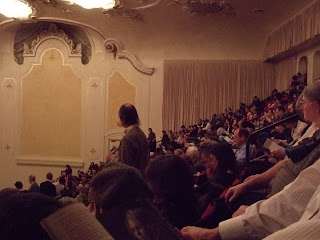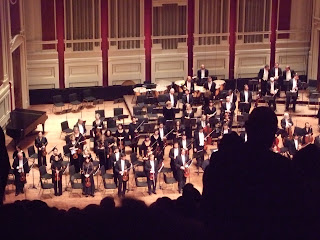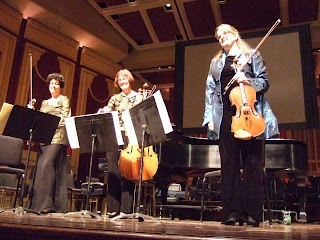The night began with percussion and the sound of winds, and that was before I arrived at the concert hall. The wind was the panting of myself and other latecoming patrons as we ran along the crowded Pittsburgh streets, hoping to arrive before PSO concertmaster and tonight's conductor Andrés Cárdenes would raise his baton, and the percussion was the impact of fireworks against the night sky, from the Steelers pre-Super Bowl rally at Heinz Field across the river.
 yself seated and had caught my breath, I detached my mind and put myself into that submissive mood were thoughts and impressions rise from instinct and not from analysis.
yself seated and had caught my breath, I detached my mind and put myself into that submissive mood were thoughts and impressions rise from instinct and not from analysis.The piece was Samuel Barber's Symphony No. 1, Op. 9. The only thing I knew about it was that it was in one movement. I didn't read the program notes. I just listened, and as I did I found that the traditional musical terms for the parts of the work rose to the surface of my mind of their own accord. "Yes . . . what a lively Scherzo! . . . or would it be a Scherzetto? . . . . Ah, here's something rather Maestoso . . . . Here's a change, there's the Andante . . . " If I'd been trying to think of this on purpose, I never could have managed.
The second item on the program was George Gershwin's Rhapsody in Blue. It was more than appropriate that that would be played in downtown Pittsburgh last night, for it always evokes urban bustle and activity for me: bright lights and cars, people hurrying to theaters and concerts, crowded stylish restaurants full of patrons sitting down to intimate and celebratory meals. And last night downtown Pittsburgh was crammed. All the playhouses and music halls were open, it was this month's exhibit opening night for the contemporary ar
 t galleries, and then you add in all the Steeler fans come down to cheer on the team. Traffic was so thick, I had to try five different garages before I could find a place to park-- that's why I was running late. Rhapsody in Blue was the ideal musical theme.
t galleries, and then you add in all the Steeler fans come down to cheer on the team. Traffic was so thick, I had to try five different garages before I could find a place to park-- that's why I was running late. Rhapsody in Blue was the ideal musical theme.The piano soloist was Gabriela Montero. The playing of the Pittsburgh Symphony didn't quite rise to the level of her performance, but she sets a very high standard. I hate to say it, but the upward sliding call of the opening clarinet was a little bodiless. I had to say, "That was it?" But the brass made up for it later, especially the riffs from the muted trumpet.
 There was nothing in the program about more music before the intermission, but I'd say almost everyone there knew what to expect. Ms. Montero is a master of improvisation, in a tradition that goes back to the young Mozart and before. She stepped to the apron of the stage and requested a theme from the audience. One man sang out, literally, "'A mighty fortress is our God!'" in recognition of the Mendelssohn Reformation Symphony to be played in the second half. But through the hubbub Ms. Montero said no, give her something more characteristic of Pittsburgh. And from several places throughout the hall, voices began to call, "'Here we go, Steelers, here we go! Here we go, Steelers, here we go!'"
There was nothing in the program about more music before the intermission, but I'd say almost everyone there knew what to expect. Ms. Montero is a master of improvisation, in a tradition that goes back to the young Mozart and before. She stepped to the apron of the stage and requested a theme from the audience. One man sang out, literally, "'A mighty fortress is our God!'" in recognition of the Mendelssohn Reformation Symphony to be played in the second half. But through the hubbub Ms. Montero said no, give her something more characteristic of Pittsburgh. And from several places throughout the hall, voices began to call, "'Here we go, Steelers, here we go! Here we go, Steelers, here we go!'"She went to the piano and plunked it out: "Daa-da-da, da! da! Daa-da-da!"
"That's it?" she queried.
"That's it!" roared back the audience.
Whereupon she sat herself down at the keyboard and took that little call and stretched it, dressed it, inverted it, reverted to it, embroidered on it, and made it an object of classical delight. Classical, yes, then she added variations Romantic, Latin, and even jazz. Whew! What must it be like to have a genius like that! If I could have any complaint to make, it's that Ms. Montero did not, as I had hoped, end her improvisation on Here We Go, Steelers! with a grand fortissimo. Surely, that would have been better luck for the game on the 1st? But I told myself not to be silly-- we were there for music, not football.
Besides, her playing that has got to be good luck for us anyway!










 I had the ticket as part of a seven-concert season series, the night's theme was "Sublime Melodies," and I couldn't remember who was to be featured or what was to be played. Would there be a vocal soloist performing some Lieder? That'd be nice, but who knew?
I had the ticket as part of a seven-concert season series, the night's theme was "Sublime Melodies," and I couldn't remember who was to be featured or what was to be played. Would there be a vocal soloist performing some Lieder? That'd be nice, but who knew? What was the piece? It was Mendelssohn's E minor Violin Concerto.
What was the piece? It was Mendelssohn's E minor Violin Concerto. 









 Theology
Theology